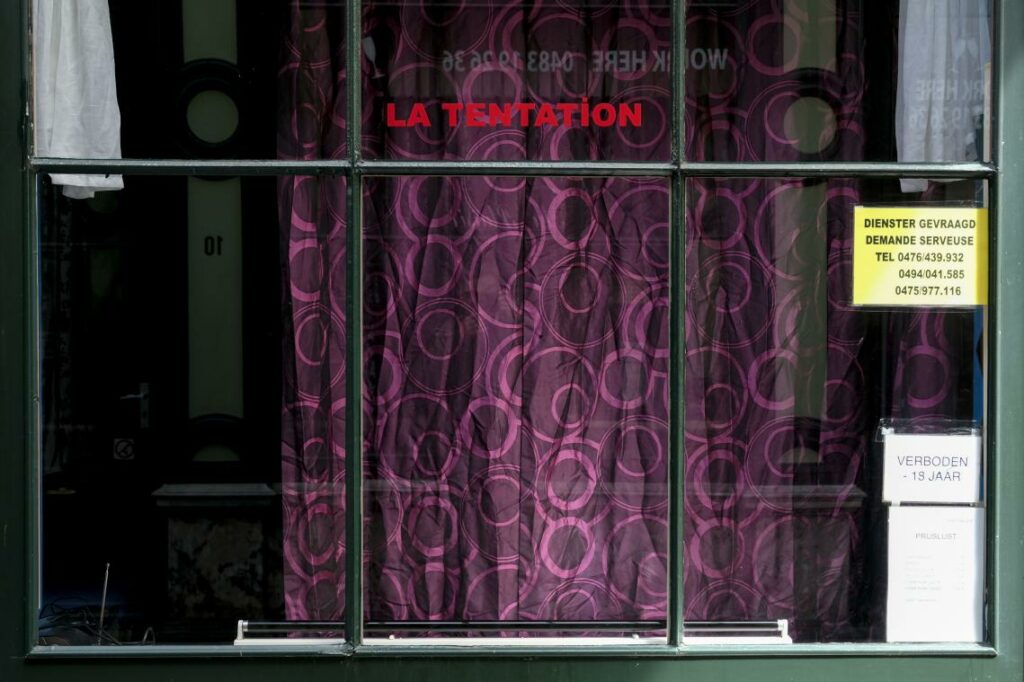Sex workers will soon officially be able to work as employees in Belgium after the Federal Government approved a draft law to protect workers from exploitation by ensuring they are given employment contracts.
Since 1 June last year, sex work is no longer prohibited in Belgium, with those in the sector now being able to legally work as self-employed workers and build up social rights. The new bill is another step forward for the protection of sex workers' rights, ensuring they can work as employees as well.
"We can no longer turn a blind eye and pretend that sex work does not exist," said Federal Economy and Employment Minister Pierre-Yves Dermagne. "I want to give a voice to a group that is not being heard. That is why we are providing a real labour contract that better protects the women and men in question from abuse and exploitation."
Those who enter into such a contract will enjoy solid protection: it guarantees access to social security and that rules around working hours and pay are respected.
Cracking down on abuses
"Last year, we took a historic step with the new sexual criminal law. This made Belgium the second country in the world to decriminalise sex work. Since then, sex workers have been able to work legally as self-employed workers and build up social rights," said Federal Justice Minister Vincent Van Quickenborne. "This is important because a lot of sex workers in our country were left out in the cold and did not enjoy protection."
With this new bill, the government has enshrined new rights and security protections for sex worker employees. "We ensure that sex workers can refuse clients and can never be obliged to perform sexual acts. The safety and wishes of the sex worker are key. We also make emergency buttons mandatory in every room and ensure a strict working framework."
Additionally, abuses and human trafficking will now be exposed faster and with more ease, so that the Justice Department can crack down on them, Van Quickenborne emphasised.
For the contract, a set of mandatory rules have established; the most important one concerns the employer with whom the sex worker decides to organise their activities. That employer must have a clean criminal record and have a registered office or establishment in Belgium.
Translation: "Last year, we decriminalised sex work as the second country in the world. Since then, it can be done legally as self-employment. Today we decided the same for sex workers who are employees. Clear signal: in our country, we respect sex workers. With equal rights and social protection."
"The recognised employer will have a duty to guarantee that sex work is carried out in a safe environment," said Dermagne. "They must respect the fundamental rights and freedoms of the people they work with. Sex workers have the right to refuse sexual partners and to refuse or interrupt specific sexual acts, without this refusal constituting grounds for possible dismissal."
For Social Affairs and Health Minister Frank Vandenbroucke, good social protection for those who work should apply to everyone. "The aim of this bill is to ensure that sex work is treated in the same way as other professions and thus given the same rights as other professions."
"Sex workers who choose this job should be guaranteed that they no longer have to lie about their occupation and that they are covered by the general social security system, with a few specific rules where necessary," he added, referring to the possibility to stop working at any time without notice, but also to refuse a certain employment action, even if requested by the employer, without penalty – and with protection.
Related News
- 'Not a taboo': Brussels to create unified policy for sex work
- Belgian Government to grant employment contracts for sex workers
- 'Historic': Belgium first in Europe to decriminalise sex work
The employer will also be obliged to ensure that a reference person is always present and available throughout the duration of the service. The employer must also ensure that every room where sex work is performed is equipped with an emergency button. "Without moral judgement; everyone has the right to a dignified existence," stressed Dermagne.
He stressed that while this step is "in no way" meant to encourage prostitution, it does provide a framework to better regulate it. "I would like to reiterate that pimping obviously remains prohibited. And if someone calls on sex workers outside the legal framework, the person in question can still be prosecuted."
The text, which was validated by the government, will be submitted to various bodies, including the social partners, the Gender Equality Council, Social Intelligence and Investigation Service (SIOD), for advice. The draft law will be discussed again based on the various opinions with a view to its final adoption.

